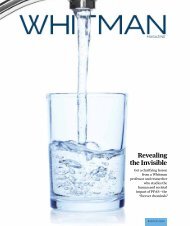Whitman College Student Welcome Guide 2021
You also want an ePaper? Increase the reach of your titles
YUMPU automatically turns print PDFs into web optimized ePapers that Google loves.
ACADEMICS<br />
Placement Tests<br />
If you are interested in taking calculus, chemistry and<br />
foreign language courses, you are advised to take a<br />
placement exam in order to register for the correct<br />
course. These tests are available online and should be<br />
taken by July 15. Access the exams at whit.mn/place.<br />
Chemistry<br />
The Chemistry Department has three tracks of introductory<br />
chemistry; which track you pursue depends on your<br />
interest and the other courses you have taken in the<br />
subject. Track 1 is for students who are considering a<br />
major outside of the sciences, and Tracks 2 and 3 are<br />
for students who are considering a major in biology,<br />
biochemistry, biophysics and molecular biology (BBMB),<br />
chemistry or geology, or pursuing a health career. The<br />
chemistry placement test is required for all students<br />
interested in either Track 2 or 3. One semester of an<br />
introductory course with lab from either Track 2 or 3 is<br />
recommended for students considering a geology major.<br />
If you have any questions, contact Associate Professor<br />
Nate Boland at bolandne@whitman.edu or 509-<br />
527-5906, or Associate Professor Tim Machonkin at<br />
machonte@whitman.edu or 509-527-5799.<br />
AP AND IB CREDIT — If you received a score of<br />
4 or 5 on the AP Chemistry exam or a score of 5, 6 or 7<br />
on the IB Chemistry exam, you will receive three credits<br />
of general chemistry (CHEM 125) after <strong>Whitman</strong> <strong>College</strong><br />
receives your exam report. <strong>Student</strong>s cannot earn credit<br />
toward the CHEM 135 lab. All students, even those with<br />
AP or IB chemistry credit, are required to complete the<br />
chemistry placement test.<br />
TRACK 1 — These introductory courses, intended for<br />
students not majoring in the sciences, fulfill the science<br />
and the quantitative analysis distribution requirement.<br />
They introduce chemistry concepts in the context of<br />
applied disciplines. You may take either course for credit,<br />
but not both.<br />
CHEM 100 — Introduction to<br />
Environmental Chemistry<br />
CHEM 102 — The Chemistry of Art<br />
TRACK 2 — Introductory courses review<br />
foundational knowledge covered in a typical high school<br />
chemistry course, but in more depth, and introduce<br />
advanced concepts required for students majoring in a<br />
science discipline.<br />
CHEM 111— Problem-Solving in Chemistry. This<br />
class is a co-requisite for CHEM 125, depending on your<br />
placement score.<br />
CHEM 125 and 126 — General Chemistry I and II<br />
CHEM 135 and 136 — General Chemistry<br />
Lab I and II<br />
TRACK 3 — Advanced general chemistry with lab<br />
(CHEM 140) is an accelerated one-semester course<br />
that covers introductory general chemistry concepts in<br />
greater detail and at a faster pace while building on the<br />
background material learned in high school. This course<br />
also introduces advanced topics that are not covered in<br />
our regular general chemistry sequence in Track 2.<br />
CHEM 140 — Advanced General Chemistry<br />
Lecture and Lab<br />
Calculus<br />
You can access the calculus placement exam at<br />
whit.mn/place. Most calculus exams given at <strong>Whitman</strong><br />
limit the use of calculators, so your placement exam will<br />
be most accurate if you do not use a calculator. The exam<br />
will help you and our faculty determine which of the<br />
following courses will best suit you:<br />
MATH 125 — Calculus I — This is the appropriate<br />
course for students who have never taken calculus<br />
and are interested in a major that requires one or more<br />
calculus courses. It is important that the student have<br />
a good background in precalculus skills as very little<br />
review of prerequisite material is provided.<br />
MATH 126 — Calculus II — Most students who<br />
earned a 4 or 5 on the Calculus AB exam are successful<br />
in this course. You will earn three credits on your<br />
transcript from your AP exam. Some of the topics in<br />
Math 126 on integration will be familiar, but most of<br />
the material on sequences and series will be new.<br />
MATH 225 — Calculus III — If you earned a 4 or<br />
5 on the Calculus BC exam, you should enroll in this<br />
course. You will earn six credits on your transcript<br />
from your AP exam. <strong>Student</strong>s who earned a 4 or 5 on<br />
the Calculus AB exam can take the placement exam<br />
to see if they are ready for MATH 225. If you start<br />
13

















